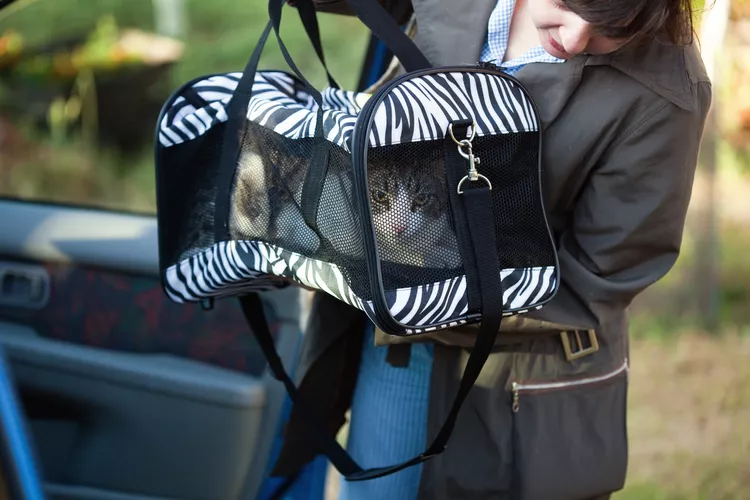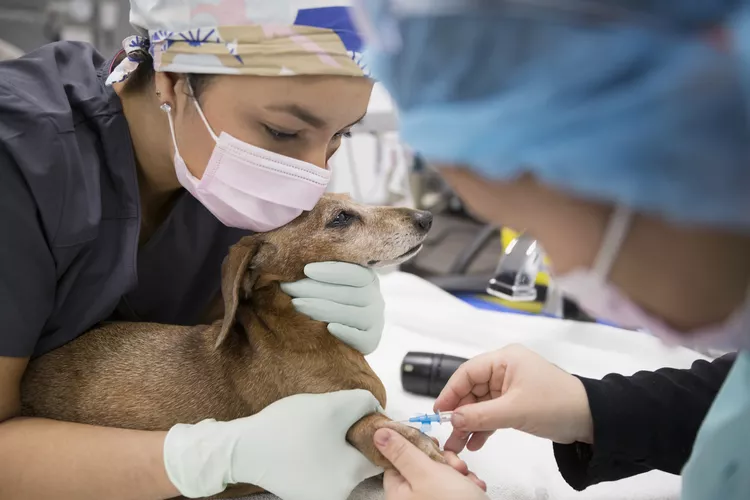
A cat acting crazy may run around the house or get a nightly burst of energy, complete with a chorus of meows. A "crazy" cat can be entertaining to watch, but the behavior could veer into destructiveness, with the cat inadvertently knocking things over, and an increased likelihood that someone gets bitten.
The cat may just be embracing its nocturnal or predatory instinct, in which case there are things you can do to support it and minimize the risk of chaos or bodily harm, or the wild behavior could also be a sign that something is wrong with their health.
No matter the breed, all cats have moments when they run across a room, meow like crazy, and act as if they're on a racetrack being chased. They dart about, faster and faster, looking all over the place, and then suddenly stop in their tracks.
This wild behavior is sometimes referred to as the "midnight crazies" when it happens at night. Your cat may entertain itself with wild activity or jump on your bed to paw at your feet, elbows, hair, or face to get you to join in the fun. The reasons for this wild and sometimes amusing behavior vary.
Cats are natural predators, and domestic cats retain this instinct to a certain extent. At times, a cat that's acting crazy may actually be exhibiting hunting behaviors, fighting maneuvers, or escape techniques.
A house cat that doesn't have to hunt for its food still needs to burn its pent-up energy, and it may be in the form of what appears to be crazy behavior. Toys, such as catnip mice, laser pointers, food puzzles, and feather wands encourage a cat to use its instincts to grab, chase, and jump. This exercise is especially important for your cat if it doesn't spend time outdoors.
Another reason for your cat’s crazy behavior could be that some cats are nocturnal and become more active at night. If a cat isn't getting enough exercise during the day, it may act especially crazy.
Many domestic cats spend their days alone indoors while their people are at work. When the cat's person comes home in the evening, the cat may be very active and want to play. If it has no outlet for all this energy, the cat may exhibit some crazy behavior. Kittens are especially energetic.
If you have an older cat, it may be acting crazy because of some cognitive dysfunction or senility. As a pet ages, its brain may start functioning differently and cause it to exhibit strange behavior for no apparent reason.
Sometimes a cat acts crazy and looks as if something is biting it sporadically because it has fleas. Particularly when meowing is involved, your cat could be hypersensitive to flea bites or simply have an itch in a place it can't reach.
If you suspect your cat has fleas, treat all the furry animals in the household with a prescription product specifically for cats, designed to kill and prevent fleas. You should also see your vet to determine if there are any secondary skin infections or allergies from the fleas that need to be treated. You'll also need to treat the environment by vacuuming, doing laundry, and using area sprays or flea bombs if recommended by your vet. Once the fleas are gone, your cat should stop this behavior.
Feline hyperesthesia syndrome (FHS) is a rare reason why a cat may act crazy, although it affects mature cats most often and the cause is unknown.
Discuss the possibility of FHS with your veterinarian if you notice that:
Sometimes it's difficult to know exactly what caused your cat to go a little wild all of a sudden. Frankly, cats are hard to interpret! Many people understand basic dog vocalizations and behaviors but don't recognize basic cat behaviors.
Dogs have expressive faces and body language that's pretty easy to accurately interpret. They wag their tails, make different noises to alert others of their moods, and often follow basic commands to please their people. Cats, on the other hand, are usually known more for their emotional vagueness and standoffish behavior. There is, however, a growing belief that cats are just as expressive as dogs. The problem is that people simply misunderstand or don’t see what or how their cats are trying to communicate.
When it comes to cats, meows and tail waves can mean a number of different things, depending on the situation. With each purr, yowl, or even blink, your feline is actually trying to communicate with you. The problem is figuring out what it's saying.
Experts say there’s something to gain from these attempts at communication. For instance, learning to read your cat's body language can strengthen your bond with it and allow you to become more effective at responding appropriately to its needs.
Every cat is different, so the best thing you can do to start is to simply observe your cat. Take mental notes of the environment and conditions present when the "crazy" behavior occurs. Pay attention to body language, vocalizations, time of day, and what your cat just did. Did your kitty just eat, groom, or scratch its back? Was there a playful meow before your cat dashed into the other room?
With time and careful observation, you'll likely begin to piece together the triggers of your cat's craziness in various situations. This will help you to understand what's normal for your cat and when any unusual behavior could be a symptom of a medical issue worth investigating with your vet.

How to Take a Car Trip With Your Cat
Think you can't travel with your cat? Think again! Traveling with your cat just takes a little preparation and planning. Here's how.
How to Determine Your Cat's Age
Determining the age of an adopted cat is just guesswork, but a vet can look at teeth, sexual maturity, fur coat, and eyes to estimate.
Cat Food Ingredients to Avoid
When checking the nutrition content of cat food, look for ingredients that are not healthy or show it is of poor quality. Avoid these 3 ingredients.
What You Need to Know About Homemade Cat Food
If you want to cook for your cat, make sure to read about the risks associated with homemade diets for cats
Can Dogs Eat Raw Chicken Feet?
What are the potential health benefits of chicken feet for dogs? What are the risks?
Macadamia Nuts and other Nuts That Are Toxic to Dogs
Find out why macadamia and other nuts are poisonous to dogs, what signs to look for, and what is needed to treat the toxicity.
10 Tips for Taking Care of a Senior Dog
Is your dog a senior? Changes to their diet, exercise, and care are required. Here's how to make sure they're living their best and healthiest life.
Hookworms in Dogs
Hookworms can make a dog uncomfortable but may also lead to serious blood loss and anemia. Learn the causes, treatment, and prevention.
Is Swiffer WetJet Safe to Use Around My Pet?
ASPCA toxicologists deemed Swiffer WetJet to be safe for use around pets, but there are other all-natural floor cleaning options available.
Can Dogs Eat Bread?
Is bread a safe snack for you dog? Are there kinds of bread you should avoid? Learn more about whether it's okay to feed your dog bread.
14 Hypoallergenic Cat Breeds for People With Allergies
There are no true hypoallergenic cat breeds. But some, such as the Siamese and Siberian, might be less likely to cause allergies than others.
Burmilla: Cat Breed Profile, Characteristics & Care
The playful and social burmilla is one of the newest cat breeds to be officially recognized by the CFA. Learn about burmilla breed.
Nebelung: Cat Breed Profile, Characteristics & Care
The Nebelung is a rare breed of domestic cat that’s known for their long gray-blue fur and gorgeous green eyes. Learn about the Nebelung cat breed.
Cymric: Cat Breed Profile, Characteristics & Care
The Cymric, a long-haired Manx, is one of the world's oldest cat breeds. This tailless cat is friendly and playful. Learn about the Cymric breed.
Here's Why Cats Groom Themselves
Learn all about cats' grooming habits: how and why cats groom, including mutual grooming, over-grooming, and displacement grooming!
Pharaoh Hound: Dog Breed Characteristics & Care
Learn all about the Pharaoh hound, a sight hound dog breed known for their slim appearance and the ability to blush when excited.
How to Walk Your Dog
Dog walks should be fun for your dog while respecting your community. Learn why walking your dog is important and get essential safety and training tips.
How to Stop Your Dog From Whining
Whining is a natural way for your dog to communicate with you. Explore the reasons dogs whine and how to discourage your dog from whining too much.
How to Stop Your Dog From Barking Excessively
All dogs bark, but excessive barking is a behavior problem. Learn how to help stop excessive barking and prevent it from happening all the time.
How to Train Your Dog to Live With Another Dog
When you add a second dog to your household, it's natural that there will be an adjustment period. Learn how to get two dogs to become acquainted.